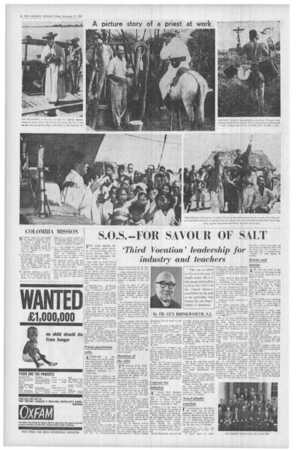Page 5, 22nd November 1963
Page 5

Report an error
Noticed an error on this page?If you've noticed an error in this article please click here to report it.
Tags
Share
Related articles
What Can Be Done?
Freedom And Progress
Noreen Murphy
Church Site In Town: Any Advice Welcome
Devotion To The Sacred Heart
S.O.S. --FOR SAVOUR OF SALT
`Third Vocation' leadership for industry and teachers
By FR. GUY BRINKWORTH, S.J.
LW would question the statement, quoted above, of our beloved Pope John of revered memory. This is an era of real opportunity for the Church of Christ.
Pope John no doubt had in mind, among other factors, the rapidly increasing compactness of society: the tendency to level up all classes, level up educational opportunities, the living in flats, the living in much larger and more compressed communities, at home, at work and at play.
Communications, motorways, the ubiquitous car, the streamlining of passenger transport . .
All these things bring the opportunities he refers to in the increase and development of sheer human and social inter-relationships, opportunities which we must counter and wrest from the hands of the powers of darkness.
Our Lord told us that his followers must be the salt which savours the whole, the leaven which suffuses and raises the lump, that they should give light in the gloom.
The ever-increasing organisation and compacting of society presents the grand opportunity for the salt to savour the whole, for a man to influence his fellows.
There is gradually taking shape a clear concept and function of a third vocation : the vocation of leadership. Priesthood, religious life. a third dedication to lay leadership: a growing need for all three.
Priest-population ratio
ALTHOUGH in this country we are not markedly participating in the general "population explosion" now taking place in the world, we are witnessing a Catholic population explosion on a minor scale.
Statistics seem to indicate a distinct approach to figures like one in four and one in five for the proportion of Catholic live births to O.D. live births.
Figures of this kind and startling and, of course, must lead to doubling and even trebling of the Catholic population within a generation or two — IF WE CAN HOLD THESE CHILDREN.
The alarming fact, however, is that we are unprepared to "service" these increasing Catholics. Schools and churches will be progressively inadequate at our present rate of building. And what is many times more importapt: we will be short of pastors in the widest sense.
For instance, the number of priests ordained in this country and Wales last year was just over 200: and this figure has remained static for about ten years.
It represents a gain of about 80 priests each year: but if the total Catholic population is already increasing at the rate of about 70,000 each year, the priest-population ratio is deteriorating all the time, and has been for the last ten years.
Indeed, during this period it has gone from about one in 450 to one in 490 and there is every indication that the deterioration will steepen its gradient in the near future.
From the point of view of available priest-power and religious-power we are in no position to face a doubling tendency in the Catholic population. The wastage through "leakage". already tragically great, would be catastrophic.
To compensate, partially at least, for this growing gap between the number of shepherds and sheep we must look to the sheep! Adult laymen and lay women must be persuaded and trained to work "in the ranks" and to fulfill a responsibility to influence and lead their fellows.
Anyone familiar with the problem of "leakage" knows that much could be done to stem it if only Catholics could be made to realise their separate responsibilities in helping by their own good example and influence, and even positive instruction and guidance.
The need for such lay men and women who will dedicate themselves to the vocation of acting as "leaders" in their own walks of life is, today, a crying one. "The field is white for the harvest . . . but the labourers are few". The third vocation!
Doctrine of the elite
THE doctrine of the "elite" has long been with us. St. Ignatius realised its importance and its efficiency, and he countered the effects of the Reformation with it.
He aimed at an elite—in scholarship by founding high schools and universities all over Europe, and in spirituality with his "Exercises". "The second point is to consider that all who have the use of judgment and reason will offer their whole selves for labour," But dedication is not enough."
The very conditions of modern society which could make leadership so effective, and indeed necessary, also make it a more skilled and delicate task. Expertise and know-how are required.
Leadership means a little more than just "setting a good example": it means the willingness and power to organise and to use to the best advantage existing organisations and set-ups.
To take the offensive without being offensive needs tact and understanding and study. Unskillful and thoughtless "leadership" can, and usually does, lead also to "sales resistance". (What a strange
coincidence that the Latin for salt is "salis"!) And so we come to the need in the Church today for "colleges of further spiritual education" — for schools of Christian Leadership.
Commercial concerns regard "conventions" and "courses" for their salesmen as absolutely essential: and are willing to pour vast sums of money into the running of them.
We need such "colleges" ourselves in the training of our lay leaders: places where keen Catholics can. in peace and quiet. strengthen their own spiritual lives and study and learn the know-how of leadership.
There are such places, needkss to say: but pitiably inadequate both in numbers and equipment: though the enthusiasm found in them and their efficiency is fantastically great. But they do need a great deal more support from the Catholics themselves who are so often quite apathetic about them.
Courses for industry
T Loyola Hall, Rainhill, near Liverpool, we have such a "college". Founded in 1908 as a retreat house at Romiley, it moved to larger premises at Rainhill in 1923.
Probably it is the oldest "ad hoc" retreat house for laymen in the country. Here, indeed, is experience, tradition and expertise. Nearly twenty years ago, with the wholehearted support of the R.A.F., these "spiritual retreats" were expanded into "courses" which, besides the spiritual retreat, contained several days of lectures, discussions and instructions on Christian Moral Leadership.
During the period, well over 100 of these courses were organised and held at Rainhill alone, some uncomfortably overcrowded. The courses won great appreciation both from the men themselves (some non-Catholics) and Service and other authorities. (The superior at Rainhill mainly responsible for these courses, Fr. P. Blake, SI, was recently awarded an O.B.E. for his work in this field).
But nothing succeeds like success: and in the last two or three years the staff at Loyola Hall has branched out into other courses more specifically designed for the needs of the Church in normal circumstances.
And so the experience gained in the R.A.F. courses has been applied to "Christian Leadership Courses" for industry and, the most recent development, for teachers.
It would not be an exaggeration to say that 99% of those who go through these courses, however sceptical they may be at the start, finish as enthusiasts.
These courses last just under the week: commencing Friday night and finishing the following Friday morning. The teachers' courses are "mixed"—that is, for both men and women.
Non-Catholic reaction
IT is interesting to note that a -1fey:, weeks ago an article appeared in Engineering by the General Secretary of the Institute of Industrial Supervisors, Mr. J. J. Henderson, giving full account of the course held during the first week of October.
Commenting on his title "Where angels fear to tread", Mr. Henderson says:
"It never pays to under
estimate the angels. The Industrial Leadership Courses held at Loyola Hall, Rainhill, Liverpool, are organised by the Roman Catholic Church.
"I first heard of them through a member of the I.I.S.—himself a non-Catholic, who had been sent on one by his company.
"He was tremendously impressed by his experience and seemed to have been more affected by the course than one normally expects anyone to be after an enjoyable training period.
"Impressed by his impressions I went along . ."
The author concludes after a long article: "Industrial leadership —a la Loyola Hall—pre-supposes a positive approach to people and problems, and avoids—like Hell! —the negative."
But as we have already said, the need of the Church is becoming more urgent with every month. The whole work needs considerable expansion if we are to avoid just scratching on the surface.
Man power and know-how we have at Loyola Hall. But two things remain. More students, and more room to accommodate them.
The organisers at Loyola Hall have approached industry and the teaching profession from above. Many industrial concerns have cooperated magnificently and so have one or two Education Authorities. But what is needed is an approach "from below". All those who feel they would like to contribute something positive to the urgent need of the Catholic Church — indeed of the Christian Church by dedicating themselves according to their abilities as leaders are asked to communicate direct with the Courses Secretary at Loyola Hall.
They will be told what to do in order to obtain "paid time" off work and even expenses paid. This of course may not be given in every case: but it is worth trying.
Exactly the same applies to teachers.
Bricks and mortar
AND now we come to the second of the needs of the work of S.O.S. And this is indeed an S.O.S.!
At present: although the accommodation at Loyola Hall is such that some 70 can he accommodated for ONE or TWO NIGHTS, this involves a great deal of crowding, and for any longer period it is unwise to take more than about 25 men at a time.
This is, clearly, quite inadequate and wasteful, involving the staff and lecturers in a great deal of effort for what is, numerically, at least, a poor return.
It is proposed to build a new wing containing some 50 single rooms with all mod. cons. built in. We would then be able to offer simple but adequate and comfortable accommodation for 75 men, or 25 women and 50 men. at a time: thus trebling the output of the important and essential work being done, not only in the courses but also in the spiritual retreats which, of course, go on all through the year.
Catholic organisations and individuals may like to help this great work by helping to build these rooms.
To build a room would cost some £600: to furnish a room (including hot and cold water) would cost about £50.
A permanent notice would be on the door of the room asking for prayers for the donors from the countless men who will make spiritual retreats in those rooms in the course of many. many years. Even the price of a bed or a chair would be appreciated.
So help this great work: by getting in touch with the "Courses Secretary" or with the "Secretary, L.D.S." (the Loyola Development Society).
blog comments powered by Disqus










